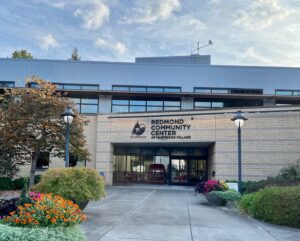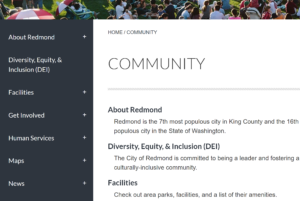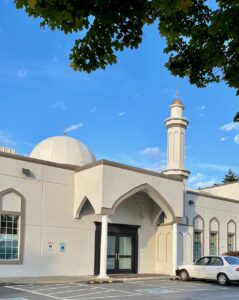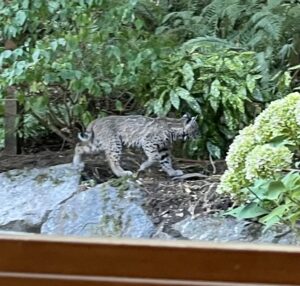Week 3 – Let’s Get This Party Started
Perfect Crossroads

Redmond’s Interim Community Center
When I moved “back to Seattle”, I actually moved to Redmond (30k/18mi away). I chose Redmond to have the closer, stronger sense of community that I felt growing up in a small city. Serendipitously, or maybe completely by design, my desire to become part of an inclusive community in my home is intersecting with my mission to build stronger communities (my reason for doing this program). So I’ve been digging into what Redmond actively thinks about, does, and offers in its effort to build community. It should definitely be thinking about it – its population grew about 35% this past decade. Imagine you arrive early to a party. The hosts might introduce you to several people (or maybe you introduce yourself) as they trickle in, but once you’re in a conversation, you miss later guests. Without an activity or intros to bring people together, it’s just several separate parties under one roof.

City website: https://www.redmond.gov/101/Community
Redmond’s Growing Party
Redmond is thinking about its big party and strongly through the lens of Diversity, Equity and Inclusion (DEI). DEI is a specific, cross-functional initiative prominently displayed on the city’s Community web page. Reports, assessments and offerings, make clear a focus on ensuring everyone has access, belongs, has a voice, and feels safe. Go, Redmond! Wait…is it working? I don’t yet know what info the city used to launch this initiative or what measurable goals are in place, so I’ve reached out to see who I can ask.
Who’s at the Party?

Mosque next to comm center
Meanwhile, a couple data points may mean engagement is broken. 1) In 2017, Redmond surveyed residents re: agreement with the DEI initiatives – only 161 responded. This data was presented to city officials as community agreement, but 161 residents cannot reasonably be considered representative. Why such a low response? 2) When I wandered down to the community center (just one aspect of city infrastructure) on Friday, I found several lovely staff people and nobody else – not even in the $16/month, unlimited access gym. Poor location? Probably not. It’s only 6 min from a very busy gym. Also, when I came out, tons of people were walking to services at the mosque next door. Likely, either people don’t know what the facility offers or it offers the wrong things.
Nobody on The Dance Floor
Not everyone has the time, interest or ability to pour through the city’s website to learn about services, activities and info (I’ve probably spent 10-12 hours so far reading through links, reports, etc.). Personally, I’d have appreciated a more personal, guided welcome to my new city. Something like an onboarding event or series videos or an ongoing podcast that isn’t just for newcomers but for everyone to hear what’s going on with the city. Podcasts are the main way I connect with information, connect with human experiences and build knowledge on a daily basis.
So… About the Project
Reflecting back on concepts that stood out to me from the Exclusion and Inequality Intensive (access, language, geography, ethnicity) along with concepts from my Coloniality of data class (different forms of data and knowledge building, empathy, language again) and concepts from interdisciplinary (ingenuity), I’ve been thinking about what kind of project I could do that falls in my wheelhouse and would enhance the city’s existing DEI efforts. I keep coming back to voices and sounds.

Non-human resident (baby bobcat) wandering through my back garden.
Idea #1: I have experience producing a podcast. I’d like to design a Redmond-specific audio product based on the afore mentioned concepts and existing city DEI initiatives. The idea would be to use voices and sounds from the community (including govt and non-human “beings”) to help people experience the city and each other, to encourage engagement among residents, and between residents and the city’s DEI infrastructure. The idea is to introducing people at ‘the party’ to each other and the city through various forms of data storytelling, interviewing, sounds.
Idea #2: The above idea may not make sense or be feasible once I talk to someone at the city. So it may be better for me to partner with the city on an existing DEI initiative.
Idea #3: A podcast of the city’s journey developing the DEI initiative along with an analysis of key data and principles that were included/excluded and identification of opportunities for improvement. Here I would develop some questions going in, e.g., “What role has language played in inclusion/exclusion?” “What role does digital access play in DEI intervention design?”
Next Steps
- Identify City Partner/Partners to clarify need/opportunity and gain support
- Data on city diversity / demographics
- Data on existing gaps
- City goals and measures
- Design/purpose of initiatives
- Status
- Develop relevant knowledge
- Literature on creating community
- (If podcast) Identify Representative Resident Partners (e.g., existing organizations/communities)
- (If podcast) Take Broadcast Journalism ethics course
It’s Not Really A Party
I’ve taken the liberty of using the party analogy to explore an idea but want to acknowledge the importance of belonging to community and the seriousness of the consequences when people are excluded (opportunities and outcomes). That said, I think there is so much joy in knowing and connecting people, whatever the circumstances.




Oh, Redmond…I used to live near there when I was a teenager, so it’s neat for me to hear about all the change it has likely gone through since I left. I like the idea of a podcast to build community. This caught my attention, for example: “The idea is to introducing people at ‘the party’ to each other and the city through various forms of data storytelling, interviewing, sounds.” I love the thought of trying to build connections between people and the rich possibilities that thought conjures.
Out of curiosity, I went googling around for something about Redmond’s DEI plans, and I ended up on the Census Bureau’s quick facts page about Redmond ( https://www.census.gov/quickfacts/fact/table/redmondcitywashington/PST045221 ). It’s got some weird stuff going on with demographics, doesn’t it? The points that jumped out at me are: the racial makeup skews away from Blacks and Hispanics (and whites, actually, too) and toward Asians (not necessarily weird for urban areas in PNW, but definitely out of ordinary for US averages), and then the other two things that got my attention were that 40.6% of people living there are foreign-born and 45.5% speak a language other than English in the home (both of those are reeeeeaaaaaalllly unusual for the US, aren’t they?). What a fascinating demographic mix you’ve been dealt there. Did you run across any reports that mention what the most commonly spoken languages in town other than English are? I see on the DEI page, they offer quick reference guides in Spanish, Chinese, Arabic, Hindi and Russian.
Hi Theresa,
Yes, the “white” population has not grown much (representing about 5K/20K of the new growth and the majority falls under “Asian”. The reason is these are primarily high-skill/high-ed immigrants being recruited to Microsoft and other large-tech business (FB, Amazon, etc.) here in Redmond and surrounds. My assumption is that established families then attract extended family and friends as well as businesses (and more immigrants) that cater to the tastes of those moving in. Naturally, a changing composition of backgrounds, languages, customs, etc. means even more need to get people connected to each other and resources – working with, caring for and knowing each other. Meanwhile, we sit geographically at the connection point between urban liberal and rural conservative – it’s gun racks and Prius’s in the parking lot.
Looking forward to hearing more about your project Janel! I think your idea of a podcast sounds super interesting, I’d love to have a podcast like that in my local town!!
What a wonderfully written blog Janel – It took me on an adventure, and I was envisioning Redmond in my head. I wonder how you will entice the broader community outside of Redmon with your podcast? Will your model be able to be applied to other communities?
Interesting comments above about demographic makeup – I have noticed sometimes community services are not used since so many people cannot access it in the language of their choice or it does not serve their needs which may be different depending on cultural experience or even just different lifestyle choices. Is there a way to be part of a community virtually if some people are not comfortable going to use the built infrastructure being offered?
All questions I have too, Darcie! I’d love to get to the root of it. I’m attending a city council meeting in an hour or so to check it out. The city has really set up so many ways to engage but people really don’t seem to be going for it. I’d like to ask someone this evening about whether they have data on usage/attendance data over time to see if it’s changed with pop growth or composition or if this is more recent (covid related). They are either missing the mark on what’s being offered or people don’t know what’s available or people aren’t motivated. Whatever the case, it seems we’re missing human connection – at least in public spaces. I have to say that their messaging, public spaces, events and services resonate with what I appreciate or think is important – but maybe that’s the problem? But I also notice that it’s all something I have to actively dig for – and it’s too easy to live in your house and routine without knowing anything going on around me. It’s super easy to ignore the 70K humans that don’t live directly next to me.